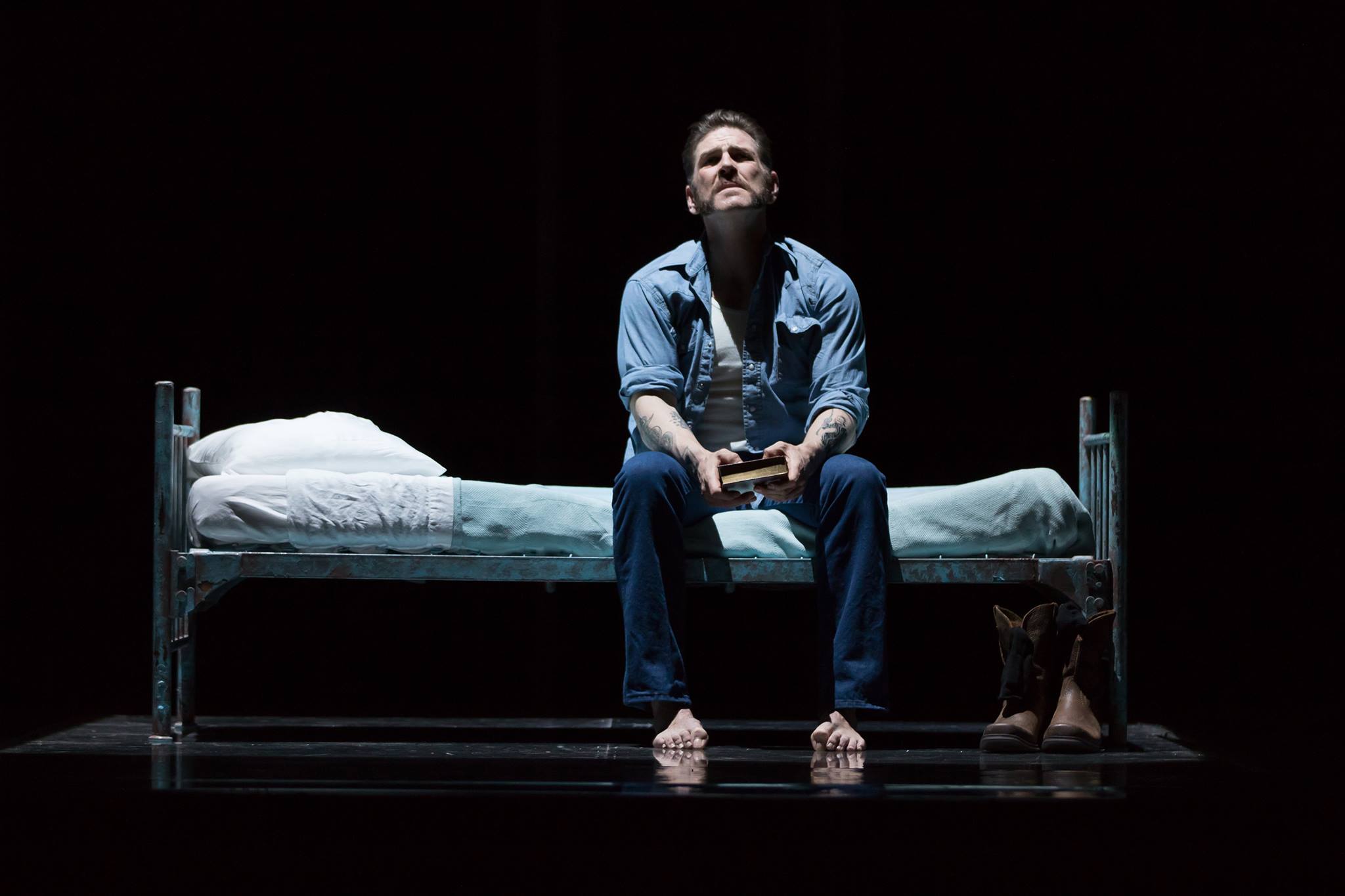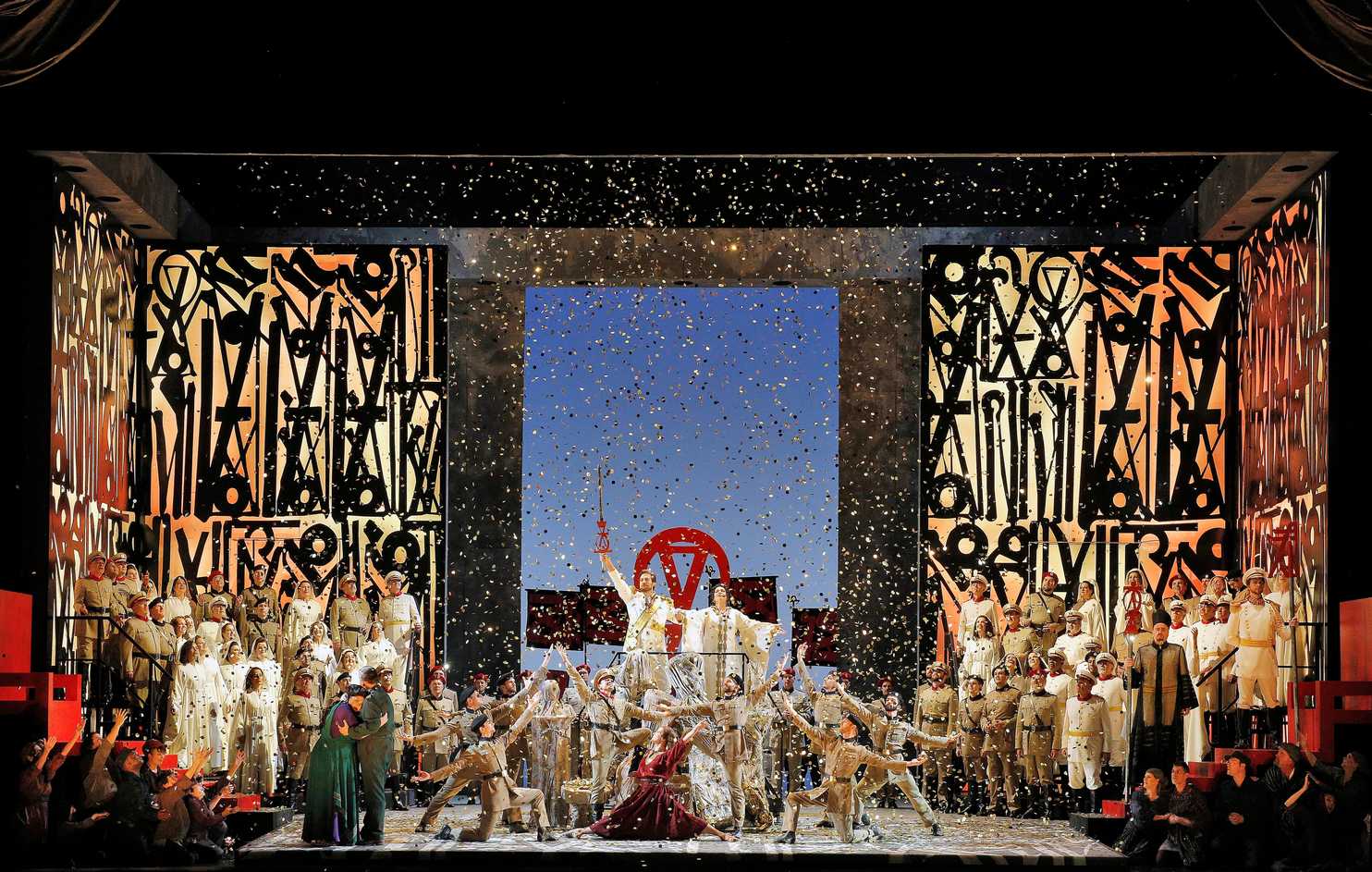Madame Butterfly in the Trump Era

Given the current occupant of its most famous address, there are times when living in Washington D.C. right now feels like a cruel, dour burlesque. The nation's capital is a gorgeous place in springtime, full of blossoming dogwood trees and gardens bursting with colorful shocks of flowers, all of which only magnify the impressiveness of the city's monuments, institutions, and public spaces. The monuments, with their inscriptions of hope and patriotic fervor on the walls, the aspirations of democracy represented by the glorious buildings, and the realization of human genius evident in its museums all reinforce the idea that progress is not only possible, but that as a nation we're experiencing it unfolding in real time, and that as a people we're constantly moving forward toward something better. Then one casts an eye toward the White House, or in the other direction toward the Capitol Building, and suddenly the harsh joke of the current moment, with its attendant greed, cruelty, and lack of integrity, feels like a mocking reproach.
Perhaps nowhere is that reproach more acutely felt than at the Kennedy Center, an institution designed to celebrate and further the values and ambitions of an optimistic, forward-looking nation, one that now seems increasingly indifferent and uninterested in the arts. One cannot imagine Donald J. Trump ever entering the place for any reason other than duty or for his own glorification. Trump, the transactional, narcissistic, vainglorious leader of the United States, and now undoubtedly the most famous person on the planet, is the ugliest American the world has ever experienced. His presidency is a stain steeping through the entire country, increasingly impossible to ignore, constantly mocking the inscriptions on the walls of the city's monuments.
The stain of Trump's ugliness creeps into Washington National Opera's marvelous production of Puccini's Madama Butterfly and stays there, scratching uncomfortably at our expectations, nearly disrupting the opera's central focus on its titular character. Intentionally or not, in this WNO production the impact of Butterfly's tragedy is matched with almost equal force by the cruel, selfish arrogance of opera's ugliest American, Lieutenant B.F. Pinkerton. Having not seen this production when it debuted at San Francisco Opera in 2014, nor its revival there shortly after last November's election, I can only speculate that the grossness of Pinkerton's actions are magnified by Trump's omnipresence in conversations and the media in ways it would have been impossible prior to his election.
Audiences, especially newcomers seeing the opera for the first time, tend to arrive at Madama Butterfly with expectations of seeing a tragic love story about a naive young girl seduced by a shallow American naval officer who turns out to be a bit of a cad. It has a killer aria everyone knows and some widely familiar music. A lazy production viewed by an inexperienced audience might result in a few people walking out the door afterward thinking "Poor Butterfly - it's horrible what happened to her and that Pinkerton sure is a bastard, even if his wife was nice and he was genuinely sorry at the end. [Sigh]. Such beautiful music." I think that was close to my own reaction the first time I saw it some 20 years ago, even though I didn't fail to grasp the opera's obvious anti-American tone.
Looking back on that experience now I have to wonder if I was just an exceptionally stupid, young, white male, or if the last 20+ years has made it all but impossible to see Butterfly as anything but the story of a young girl's exploitation by men (Japanese and American), albeit one with a lot of beautiful music. Is it possible for contemporary audiences to watch Butterfly now and not feel the lurking shadows of sex tourism, Boko Haram, honor killings, Bill Clinton, Bill Cosby, Bill O'Reilly, Roger Ailes, and yes, the current President of the United States, especially when one of its main characters might as well be one of his sons, a transactional chip off the ol' Trump block, out for all he can get?
As Pinkerton, Brian Jagde seems well aware of this in a performance that raises his already promising stature. I've seen Jagde, who makes his WNO debut here, in a number of roles dating back to his days as a Merola Program participant -- some have been very impressive (Janek in Vec Makropulos), others less so, with his exceptional vocals abilities hampered by an inability to convincingly portray the character (Don Jose in Carmen, Cavarodossi in Tosca). In this Butterfly he nails both with a clear, strong voice that fills the large house and a dramatic performance that gives the role significantly more influence than usual despite being swathed in a ridiculous costume that makes him look like a Hot Dog on a Stick employee wearing a uniform that's been redesigned by Piet Mondrian. It's a performance that could take the young tenor to another level (Dmitri Pittas alternates in the role).
It's Butterfly's story of course, but Pinkerton drives it. With his ship docked in Nagasaki, he sets about enjoying the advantages of being a prosperous American surrounded by poor people, which includes a steady flow of whiskey and women. Goro, a pimp, offers to set him up with a temporary bride to make his stay more pleasurable. The bride is Butterfly, an innocent teenager who's become a geisha after her family suffers dishonor and descends into poverty. She sees marriage to the American as a path to security and a return to status. To achieve it she'll forswear her family and her religion, and adopt his ways as her own. She has no clue Pinkerton sees the entire arrangement as a convenience, life ashore with benefits, and even though he develops a fondness for the girl he's only in it until his ship sails.
When it does, he promises Butterfly he'll return. She believes him, and waits, spurning offers from well-meaning suitors and becoming increasingly isolated from her own society as she maintains her "American home." Three years later, Pinkerton's ship finally returns, and this time he's brought his American wife with him. He's shocked to discover that not only did Butterfly take him at his word, but that's she's been counting on his return to her ever since he left. It doesn't end well for Butterfly, and the story concludes with her surrendering what little she has left because she made the mistake of believing Pinkerton's words, none of which he ever had any intention of standing by. Is this beginning to sound familiar?
Jagde creates a convincing onstage relationship with Ermonela Jaho's Butterfly (also making her company debut, and one of three singers appearing in the role during the 13-performance run). Jaho might not be the youngest of Butterflys, and she conveys an emotional maturity that's way beyond the character's age, but she uses it to put the audience through the wringer. Her transformation from the young, hopeful, and desperate-to-please 15-year-old girl of the first act to the desperate-to-survive, emotionally ground down 18-year-old in the second is heartbreaking in ways many singers can't reach. Jaho also gives a splendid vocal performance, announced at her entrance and building from there to the shattering climax, despite moments where Philippe Auguin's conducting threatened to steamroll her. Auguin refused to indulge the score's sentimentality, stripping away most of its luxuriousness in favor of sharp accents and a jaunty pace that at times came perilously close to undoing the heart-tugging quality of the opera's most famous music and arias, yet managed to avoid actually doing so, making Jaho's debut a triumph.
The colorful, swirling palette of Jun Kaneko's abstract set, video projections, and costumes, combined with Gary Marder's lighting, makes everything pop as if the entire opera takes place within a high-definition diorama. The result is a kind of fairytale setting that mines both traditional and pop Japanese culture for inspiration, creating a vivid contrast between setting and story.
Finally, the rest of the cast is top-notch vocally, and under Leslie Swackhamer's direction give convincing, well-sung performances. Together they drive home Butterfly's drama with a passion and urgency often missing in productions of opera's biggest moneymaker, notably Kristen Choi's Suzuki, all too aware of Butterfly's delusions; Ian McEuen's nasty Goro; Timothy J. Bruno as the unforgiving and imperious Bonze; and Michael Adams, who makes a big impression in the tiny role of Prince Yamadori by making him so appealing that Butterfly's rejection of him makes her seem obviously and irrevocably doomed. As Sharpless, Troy Cook was slightly underpowered compared to everyone else on stage, but he successfully came across as the only adult in the room.
You likely won't see a better production of this classic for some time. See one of the remaining performances.





